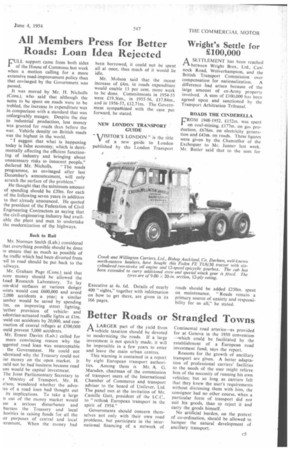All Members Press for Better Roads: Loan Idea Rejected
Page 43

If you've noticed an error in this article please click here to report it so we can fix it.
FLL support came from both sides of the House of Commons Past week when a motion calling for a more extensive road-improvement policy than that envisaged by the Government was passed.
It was moved by Mr. H. Nicholls (Cons.), who said that although the sums to be spent on roads were to be trebled, the increase in expenditure was in comparison with a standard that was unforgivably meagre, Despite the rise in industrial production, less money was granted for roads than before the war. Vehicle density on British roads was the highest in the world.
"I suggest that what is happening today is false economy, which is detrimentally affecting the efficient functioning of industry and bringing about unnecessary risks to innocent people,"
declared Mr. Nicholls. "The roads programme, as envisaged after last December's announcement, will only scratch the surface of the problem."
He thought that the minimum amount of spending should be £20m. for each of the following seven years in addition to that already announced. He quoted the president of the Federation of Civil Engineering Contractors as saying that the civil-engineering industry had available the plant and men to undertake the modernization of the highways.
Back to Rail
Mr. Norman Smith (Lab.) considered that everything possible should be done to ensure that as much as possible of he traffic which had been diverted from au to road should be put back to the .ailways.
Mr. Graham Page (Cons.) said that nore money should be allowed the toad Research Laboratory. To lay ion-skid surfaces at various datiger Joints would cost £600,000 and avoid 2,000 accidents a year; a similar umber would be saved by spending lm. on improving street lighting. .urther provision of vehicleand edestrian-actuated traffic lights at Elm. .ould cut accidents by 20,000, and conruction of central refuges at £500,000 ould prevent 5,000 accidents.
Mr. Ernest Davies (Lab.) called for more convincing reason why the iggested road loan was unacceptable the Government. He could not iderstand why the Treasury could not ise money on the open market. It Juld not be bad business because road ans would be capital investment.
The Joint Parliamentary Secretary to e Ministry of Transport, Mr. H. o!son, wondered whether the advotes of a road loan had thought out its implications. To take a large ri out of the money market would Ise a serious disturbance and barrass the Treasury and local horities in raising funds for all the ler purposes of central and local rernment. When the money had been borrowed, it could not be spent all at once, thus much of it would lie idle.
Mr. Molson said that the recent increase of £4m. in roads expenditure would enable 13 per cent, more work to be done. Commitments in 1954-55 were £19.36m., in 1955-56, £17.84m., and in 1956-57, £12.71m. The Government sympathized with the case put forward, he stated.
NEW LONDON TRANSPORT GUIDE "VISITOR'S LONDON" is the title V of a new guide to London published by the London Transport Executive at 4s. 6d. Details of nearly 400 "sights," together with infdrmation on how to get there, are given in its 166 pages.












































































































